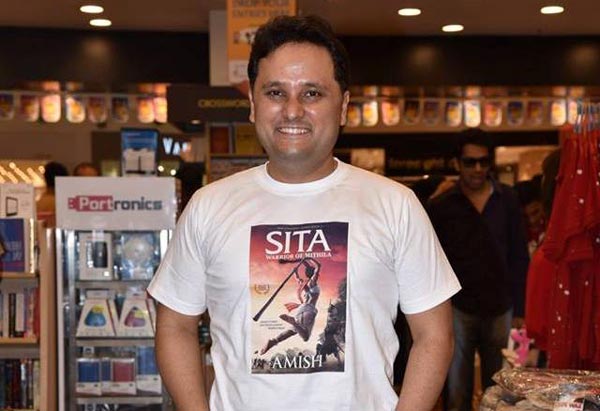
Centrists not well represented in public debate space: Amish
Tell me about the story of the book briefly.
Immortal India is my thought on various social issues in our country using the lens of our ancient wisdom. I feel that there are several positive liberal messages hidden in our ancient culture which, regrettably, are unknown to many because we do not teach them in our education system. So, I address various issues in this book like women's rights, freedom of expression, LGBT rights, historical issues, social issues, in the form of thousand to fifteen hundred word-articles so that one can read them in discrete pieces.
How did you strike upon such a story line?
The way has been the same for me like other fictional books that I have written till now. They all are fictional stories but loosely have at their core have some philosophies or points of view that I want to convey. So, normally the philosophy and points of view are step one and two, respectively, which is a wrapper around the philosophy. I have always conveyed the step two, which is the story but with Immortal India, I am conveying the step one. It is the core philosophies themselves, straight up, so it is a different genre for me.
How do you see the issues in present India which you have dealt in the book?
I feel two things. India had seen a very rapid change post 1991, after the economic reforms. Of course, poverty has declined though we still have to do a lot more. But the achievement has been good since 1991. This has also led to a lot of cultural changes and with any process of change, some negatives do emerge. Any process of change is disruptive, so that is one aspect. Second aspect which I feel is in the public debate space. Regrettably, we have two groups of extremists -the left wing and the right wing extremists - who are just after one another. Many of the centrists, who are avast majority in the country but not so well represented in the public debate space, need to speak up a bit more. Centrists are the majority in the country but not well represented in the public debate space.
Do you think the political wings, left wing and right wing, becoming intolerant towards each other leading to the chaos in the country?
No, this chaos is there only in the public debate space. Most common Indians are actually getting on with their lives. The point one is trying to make that the common Indians, who are actually across all places, communities, are largely centrists. We are deeply religious, liberal as well. By liberal, I mean the ability to describe different points of view but we are not a part of the public debate space. We need to make ourselves heard a little bit more for the good of public debate. The country is okay but it is the public debate space which is involved into this screaming matches which serves no purpose.
How do you see social media into this public debate?
Social media adds to this. One of the things I keep emphasising is that Twitter (social media) is not India (not everything). I am not denying that Twitter has a role to play but that is not India and we must always know that in mind. Debates on television channels are not India. India is far bigger than these.
Are you saying that people are getting involved into the social media too much instead of looking into the world?
No, I am saying that people are getting lost only on social media and TV debates and newspaper. Actually, there are two groups that are taking each other out all the time but this is not India. The country is far bigger. And in this debate space, people are not listening to the other side. All they want is to know how do they classify one into left wing or right wing. They are not even listening to the debating points. People are only trying to classify an individual and then decide whether to attack or support them.
How do you feel when you see some angry debates are taking place on social media where one is after the other? Is it painful to an author?
I think it is the nature of the modern debate. What has happened in modern debates, sadly, is the loss of nuance. Everything tends to get simplified. In the public debate space, that is the small circle, people like to see black and white but the world is actually not black and white. Nothing is simplistic. One cannot put the nuances in 140 characters (Twitter) and that is one of the sources of the problem. Things tend to be viewed very simplistically when actually life is very complicated. The nuances are getting lost.
Is it because social media is easily accessible, people tend to comment on anything?
No, that is good. Everyone must have the right to speak. The point is whether that should be the part of the public debate space which people listen to. There is certainly a case for every different shade of opinion to be heard. It should not be the case where one shade of opinion dominates one newspaper or the other. So in that sense, social media has been good. But everything has both positives and negatives in it. The negative is that everything is reduced to 140 characters so there is no nuance. So it will be better if all mainstream media gives openness to all points of view.
Image: Facebook page of Amish Tripathi.
Support Our Journalism
We cannot do without you.. your contribution supports unbiased journalism
IBNS is not driven by any ism- not wokeism, not racism, not skewed secularism, not hyper right-wing or left liberal ideals, nor by any hardline religious beliefs or hyper nationalism. We want to serve you good old objective news, as they are. We do not judge or preach. We let people decide for themselves. We only try to present factual and well-sourced news.







